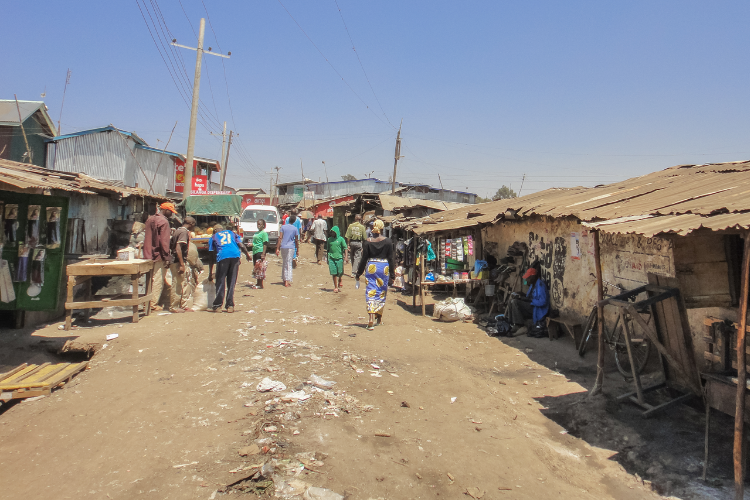
An update on the Manchester-led study tackling COVID-19 in informal Kenyan settlements
It is estimated that 25% of the world’s urban population live in informal settlements, with this figure increasing to an astounding 51% in sub-Saharan locations. Defined as residential areas, whereby individuals do not have formal ownership of the land, such locations present with challenging socio-economic conditions.
In Africa, informal settlements are characterised by their dense populations, with residents often living in poverty and under extremely overcrowded conditions. This includes unsanitary living standards, lack of basic services and waste disposal systems and absent housing regulations.
With the transmission of communicable, infectious disease already presenting as one of the leading causes of death in Kenya, the COVID-19 pandemic further fuelled this health burden. Despite the government imposing travel restrictions, many residents had no choice but to continue their travel between settlement areas to maintain their source of income. Thus, transmission of the disease remained a challenge despite government efforts.
Due to added difficulties in achieving mass vaccination coverage in low-and-middle income countries, simple, cost-effective public health interventions are vital first steps for mitigating disease risk and transmission in Kenya, particularly in the early stages of any current or future pandemics. How effective such public health interventions can be in these crowded environments has never been determined.
Therefore, in 2020, a cross-disciplinary team of researchers and colleagues from the University’s Department of Geography, Global Development Institute and FBMH, assessed the effectiveness of COVID-19 related health campaigns at enhancing the knowledge, attitudes and practices (KAPs) of residents across three large informal settlements in Kenya: Kisii county, Nairobi and Nakuru county.
Having obtained funding through the Global Challenges Research Fund, the team were able to use innovative geographic information systems to identify random geographical locations within the settlements where these surveys were conducted, before and after the delivery of a well-planned public heath campaign.
The campaign in the study occurred alongside existing government-led interventions. It included the distribution of more than 60,000 locally sourced reusable masks, hand sanitisers, delivery of health workshops, media campaigns and informative leaflets. All work on the ground was conducted by trained local field workers, in cooperation with community health volunteers, local officials and village elders, ensuring messages were communicated through trusted personnel with knowledge of the local area and language.
The findings from the study highlighted that consistent and targeted health campaigns in informal settlements can facilitate compliance, engagement and understanding alongside ongoing public health campaigns.
For example, prior to the health campaign delivered in this study, more than 95% of individuals surveyed already reported mask use. However, the post-campaign survey revealed a further significant increase in the frequency of mask wearing. The study also showed that the local population’s preference for disposable masks over reusable cloth masks and highlighted need for planned disposal of these masks as a potential challenge in these settings. The knowledge and attitudes to all public health interventions also showed a significant increase in the second survey.
Attitudes towards COVD-19 testing remained unchanged, with participants still reporting fear and concerns associated with a positive result. This highlights the importance of specific interventions which address misconceptions and the need to provide socio-economic support for those testing positive if a ‘test & isolate’ policy is to be successful in these settings.
Commenting on the study, Professor Mahesh Nirmalan, Principal investigator, said “It was extremely rewarding to be able to deliver this study, which involved multiple agencies and study partners in Kenya and in the UK during the height of the pandemic. We are extremely grateful to the University and the GCRF for their forward vision in supporting this important study”.
Find out more:

0 Comments